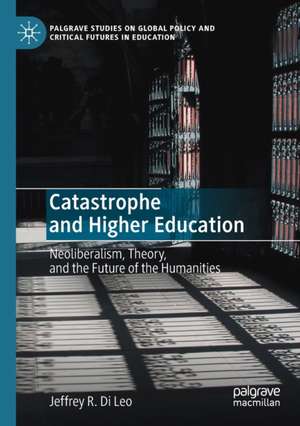Catastrophe and Higher Education: Neoliberalism, Theory, and the Future of the Humanities: Palgrave Studies on Global Policy and Critical Futures in Education
Autor Jeffrey R. Di Leoen Limba Engleză Paperback – 13 dec 2021
This book asks what it means to live in a higher educational world continuously tempered by catastrophe. Many of the resources for response and resistance to catastrophe have long been identified by thinkers ranging from Ralph Waldo Emerson and William James to H. G. Wells and Emanuel Haldeman-Julius. Di Leo posits that hope and resistance are possible if we are willing to resist a form of pessimism that already appears to be drawing us into its arms. Catastrophe and Higher Education argues that the future of the humanities is tied to the fate of theory as a form of resistance to neoliberalism in higher education. It also offers that the fate of the academy may very well be in the hands of humanities scholars who are tasked with either rejecting theory and philosophy in times of catastrophe—or embracing it.
| Toate formatele și edițiile | Preț | Express |
|---|---|---|
| Paperback (1) | 888.80 lei 43-57 zile | |
| Springer International Publishing – 13 dec 2021 | 888.80 lei 43-57 zile | |
| Hardback (1) | 892.74 lei 43-57 zile | |
| Springer International Publishing – 12 dec 2020 | 892.74 lei 43-57 zile |
Preț: 888.80 lei
Preț vechi: 1083.90 lei
-18% Nou
Puncte Express: 1333
Preț estimativ în valută:
170.13€ • 184.86$ • 142.100£
170.13€ • 184.86$ • 142.100£
Carte tipărită la comandă
Livrare economică 21 aprilie-05 mai
Preluare comenzi: 021 569.72.76
Specificații
ISBN-13: 9783030624811
ISBN-10: 3030624811
Pagini: 272
Ilustrații: XIV, 272 p. 1 illus.
Dimensiuni: 148 x 210 mm
Greutate: 0.38 kg
Ediția:1st ed. 2020
Editura: Springer International Publishing
Colecția Palgrave Macmillan
Seria Palgrave Studies on Global Policy and Critical Futures in Education
Locul publicării:Cham, Switzerland
ISBN-10: 3030624811
Pagini: 272
Ilustrații: XIV, 272 p. 1 illus.
Dimensiuni: 148 x 210 mm
Greutate: 0.38 kg
Ediția:1st ed. 2020
Editura: Springer International Publishing
Colecția Palgrave Macmillan
Seria Palgrave Studies on Global Policy and Critical Futures in Education
Locul publicării:Cham, Switzerland
Cuprins
1. Introduction.- 2. Education and Catastrophe.- 3. Little Blue Books.- 4. All Publishers are Equal.- 5. Academic Privilege.- 6. The End of Morality.- 7. Post-Literature America.- 8. A Century of Antitheory.- 9. Catastrophic Theory.- 10. Pessimistic Education.- 11. Coda.-
Notă biografică
Jeffrey R. Di Leo is Professor of English and Philosophy at the University of Houston-Victoria, USA. He is founder and editor of symplokē, and Executive Director of the Society for Critical Exchange and its Winter Theory Institute. His books include Corporate Humanities in Higher Education (2013) and Higher Education under Late Capitalism (2017).
Textul de pe ultima copertă
“It is impossible to understand the politics of higher education outside of its historical and contemporary contexts. Di Leo has written what may be one of the most important books on higher education of the last few decades. Not only is the book beautifully written, it is superbly informative and theoretically ground-breaking. At a time when the concept of catastrophe moves from science fiction to a dystopian reality, this book offers a mix of critique and hope that allows us to rethink, if not reclaim, from the ashes of a pandemic a new understanding of the reality and promise of higher education.”
—Henry A. Giroux, Professor for Scholarship in the Public Interest and The Paulo Freire Distinguished Scholar in Critical Pedagogy, McMaster University, Canada
This book asks what it means to live in a higher educational world continuously tempered by catastrophe. Many of the resources for response and resistance to catastrophe have long been identified by thinkersranging from Ralph Waldo Emerson and William James to H. G. Wells and Emanuel Haldeman-Julius. Di Leo posits that hope and resistance are possible if we are willing to resist a form of pessimism that already appears to be drawing us into its arms. Catastrophe and Higher Education argues that the future of the humanities is tied to the fate of theory as a form of resistance to neoliberalism in higher education. It also offers that the fate of the academy may very well be in the hands of humanities scholars who are tasked with either rejecting theory and philosophy in times of catastrophe—or embracing it.
—Henry A. Giroux, Professor for Scholarship in the Public Interest and The Paulo Freire Distinguished Scholar in Critical Pedagogy, McMaster University, Canada
This book asks what it means to live in a higher educational world continuously tempered by catastrophe. Many of the resources for response and resistance to catastrophe have long been identified by thinkersranging from Ralph Waldo Emerson and William James to H. G. Wells and Emanuel Haldeman-Julius. Di Leo posits that hope and resistance are possible if we are willing to resist a form of pessimism that already appears to be drawing us into its arms. Catastrophe and Higher Education argues that the future of the humanities is tied to the fate of theory as a form of resistance to neoliberalism in higher education. It also offers that the fate of the academy may very well be in the hands of humanities scholars who are tasked with either rejecting theory and philosophy in times of catastrophe—or embracing it.
Caracteristici
Engages with recent trends in postcritique and speculative realism Draws on thinkers such as Ralph Waldo Emerson, H.G. Wells, and Will Durant as well as contemporary thinkers such as Martha Nussbaum, Henry Giroux, and Rita Felski Written accessibly in a way that bridges philosophy, literary studies, and critical pedagogy




